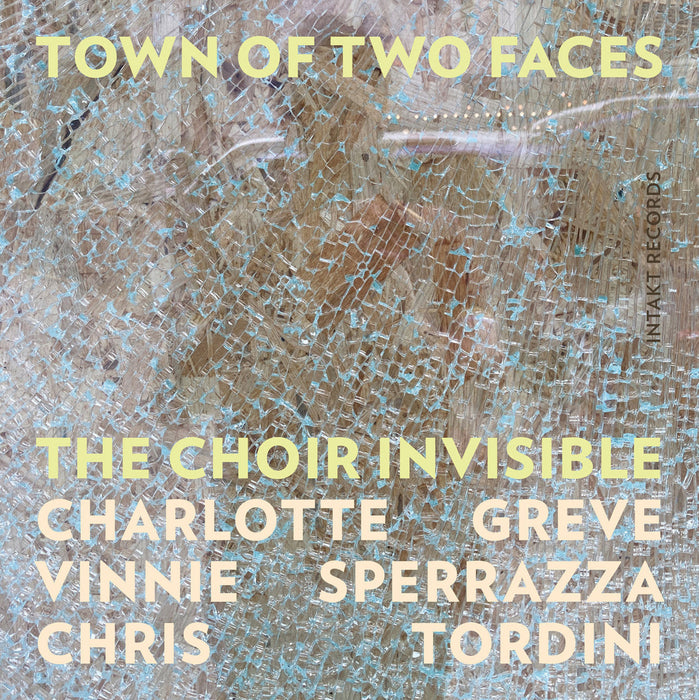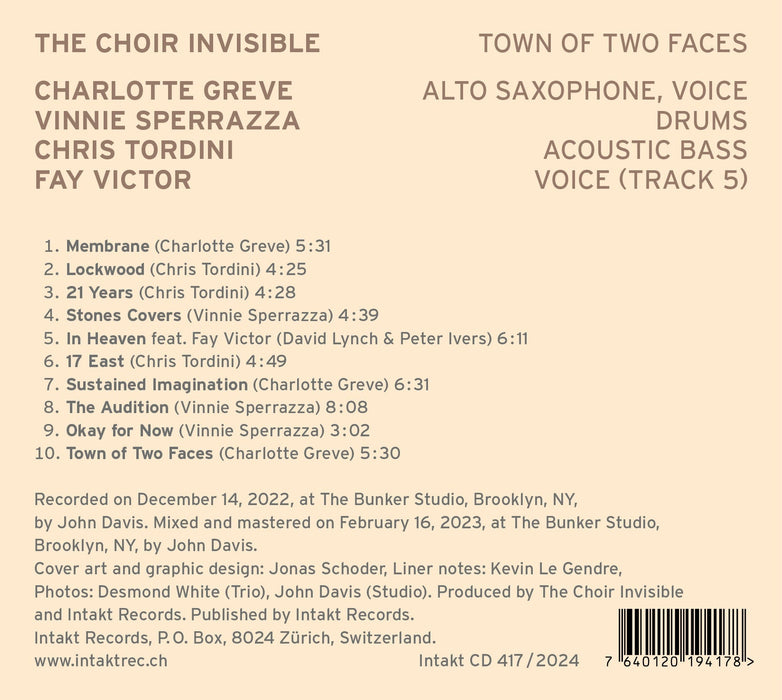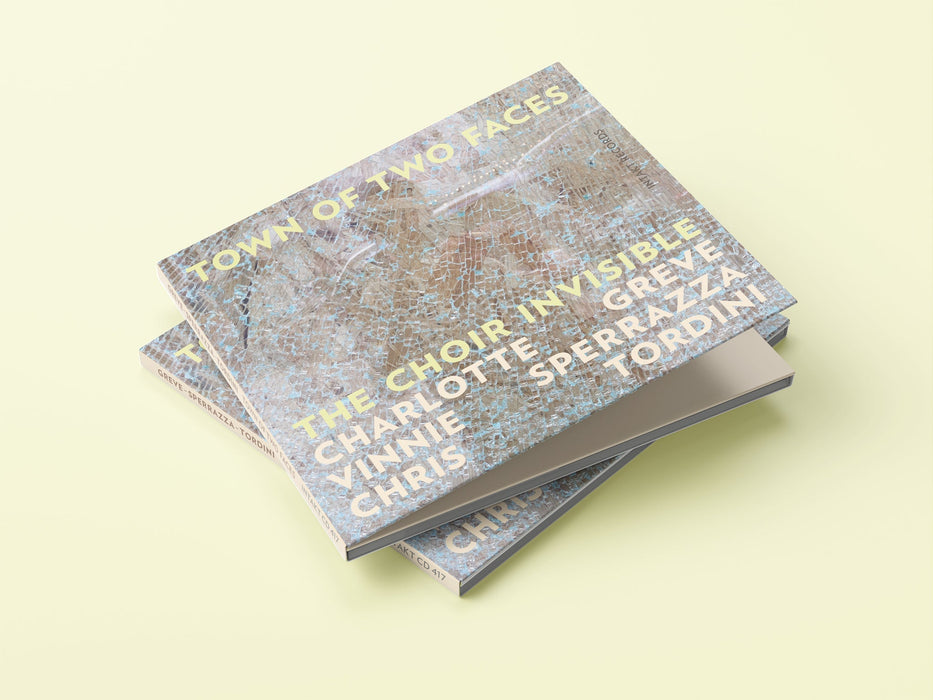


417: THE CHOIR INVISIBLE. Town Of Two Faces
Intakt Recording #417 / 2024
Charlotte Greve: Alto Saxophone, Voice
Vinnie Sperrazza: Drums
Chris Tordini: Acoustic Bass
Fay Victor: Voice (Track 5)
Recorded on December 14, 2022, at The Bunker Studio, Brooklyn, New York.
More Info
The captivating trio The Choir Invisible, comprised of Brooklyn’s creative music scene notables Charlotte Greve, Vinnie Sperrazza and Chris Tordini, present a long-awaited second album. On Town of Two Faces, they continue to develop their organic language, which allows the interplay to be dense and freer without a harmony instrument, into a lively dialog. “The music seemed to appear so easily, with a lot of flexibility, wandering from something extremely tender, subtle and quiet to a collective big, intense outpouring of energy,” says German-born Brooklyn-based Greve and Tordini adds: “I believe the real sweet spot of our band is a kind of quiet intensity.” In addition, Fay Victor gives the trio’s sound its own character with her charismatic voice as a guest on one track. “With all three bandmembers bringing compositions to the table the emotional and structural content of their music is pleasingly broad, but one dominant aspect of The Choir Invisible is its sense of measure, if not restraint”, writes Kevin Le Gendre. A trio at the highest level!
Album Credits
Cover art and graphic design: Jonas Schoder
Liner notes: Kevin Le Gendre
Recorded on December 14, 2022, at The Bunker Studio, Brooklyn, NY, by John Davis. Mixed and mastered on February 16, 2023, at The Bunker Studio, Brooklyn, NY, by John Davis. Produced by The Choir Invisible and Intakt Records. Published by Intakt Records.
Dass sich hinter The Choir Invisible kein Chor, sondern die deutsche Saxofonistin Charlotte Greve, der amerikanische Schlagzeuger Vinnie Sperrazza und sein Landsmann Chris Tor-dini am Bass verbergen, dürfte mittlerweile bekannt sein, denn Town of Two Faces ist bereits das zweite Album des Trios. Die Klangsprache der drei ist transparent und leicht versponnen, was natürlich auch dem Fehlen eines Harmonieinstruments geschuldet ist. Dadurch steht Gre-ves Saxofon oft ungeschützt im Raum, während das Rhythmus-Team doch eher im Hintergrund wirkt - auch wenn es dort eine Menge Entdeckenswertes für die Ohren produziert. Eine ruhige Intensität bescheinigt Tordini der Band, die auf einem der zehn Tracks auf ganz besondere Art aufgebrochen wird, denn auf „In Heaven" ist US-Sängerin Fay Victor zu Gast - ihren Beteuerungen „Everything is fine in heaven" glaubt man allerdings nicht so ganz, denn dafür klingt ihre Stimme dann doch zu gequält. Die Sängerin, die auch schon Songs des in Vergessenheit geratenen Pianisten Herbie Nichols zu neuem Leben verholfen hat, hat ein Händchen für leicht verschrobenes Repertoire und im letzten Jahr auch das äußerst bemerkenswerte Solo-Album Blackity Black Black Is Beautiful veröffentlicht, auf dem sie zwischen Gesang, Spoken Word, Jazz und Elektronik hin-und herchangiert.
For its second outing, Town of Two Faces, The Choir Invisible- the simpatico threesome of German-transplant Charlotte Greve (alto), Chris Tordini (bass) and Vinnie Sperrazza (drums) - continues in the vein established by its winning eponymous debut. In the liner notes, Tordini characterizes the band's sweet spot as a kind of quiet intensity, and that description is amply met by the ten cuts which make up this 2022 studio session. The shared writing credits signal the predominant communal ethos: three from the pen of each of the principals, alongside one cover. This diverse authorship, an air of wistful introspection, prevails throughout a date that privileges the pastel hues. Yet this coloration does serve to make even the slightest hint of primary color (e.g. a multiphonic flourish here or an assertive drumroll there) assume greater significance. An understated complexity pervades the set, as the carefully-crafted arrangements translate into a wealth of activity happening below the surface. Although Greve's elegant silky alto provides the lead voice, Tordini's muscular counterpoint at the intersection of melody and rhythm and Sperrazza's exquisite shading and tuneful beats immeasurably enhance the overall impression.
Further affirming the collective approach, solos tend to be brief and integrated into the fabric, whether Tordini's rippling intro to "21 Years" or Greve's dances and twirls through "17 East". Coming halfway through the program, "In Heaven" (a song from David Lynch's surreal film Eraserhead) offers a cannily-timed change of pace. Guest vocalist Fay Victor's bluesy growl extracts all manner of nuance from the eerie incantatory languor. Other highlights include the hymn-like "Sustained Imagination", where a dirge delicately blooms, and the sorrowful "The Audition", ultimately buoyed by a defiantly twisting final refrain.
Mention must also be made of the title track, sung by Greve in an attractively winsome voice (recalling Suzanne Vega in her heyday), which concludes an album that worms its way into your head almost without you noticing, and once there refuses to let go.
A few months ago the Choir Invisible—the New York trio comprised of German saxophonist Charlotte Greve, bassist Chris Tordini, and drummer Vinnie Sperrazza—dropped its lovely second album Town of Two Faces (Intakt), a delicate, agile refinement of its whispery post-bop. It’s a collective endeavor in numerous ways: each member contributes compositions to the band, and the group’s attack feels exceptionally balanced. Naturally, a jazz trio is inherently a joint effort, but considering its tune-based modus operandi no participant is ever reduced to a simple role. Tordini obviously sketches out the harmonic framework of each piece, but his presence extends well beyond a muscular low-end. On his composition “Lockwood” he underlines the changes while simultaneously engaging in melodic conversation with his bandmates. As he says in Kevin Le Gendre’s liner note essay, “I believe the real sweet spot of our band is a kind of quiet intensity,” and, indeed, the trio brings its heat with a gentle touch, usually imparting its laser-focus without turning up the volume. On Sperrazza’s ballad “Stones Covers” Tordini spreads his notes far apart, allowing the resonant rumble of the drummer’s tom strikes to occupy much of the space, as Greve unleashes the pretty melody with all of the patience in the world. While the saxophonist might seem like the group’s central focus, her lines often support the activity of her rhythm section, while, as noted above, the drummer’s contributions are textural and melodic as much as they are rhythmic.
In addition to her strengths as an alto saxophonist Greve is also a solid singer, something she devotes greater emphasis toward in her project Wood River, but she does use her voice on the title track, which she wrote. But the surprising voice on Town of Two Faces belongs to guest Fay Victor, who applies her forceful, emotionally potent instrument to a reading of “In Heaven,” a tune by director David Lynch used in Eraserhead and subsequently covered by rock acts like the Pixies, Zola Jesus, and Bauhaus. Victor extends a sound previously finessed by Abbey Lincoln and Betty Carter—thick, lush, and marked by surprising turns of phrase, using it as an instrumental color as much as a narrative element—and her performance is remarkably assured, deftly supported by the trio who deserve credit for including such a dynamic, extroverted excursion in the middle of an album characterized by elegant restraint. The trio is currently on tour in Europe and plays in Berlin on Tuesday. April 30 at A-Trane. Below you can check out the album’s opening track, “Membrane.”
https://petermargasak.substack.com/i/143860384/the-hushed-beauty-of-the-choir-invisible
The elegant second album from the Brooklyn based trio of alto saxophonist Charlotte Greve, drummer Vinnie Sperrazza and bassist Chris Tordini features compositions by all three musicians, plus a fine cover of David Lynch and Peter Ivers's "In Heaven" with guest vocalist Fay Victor relishing its blues inflections. Greve's "Membrane" opens with sinuous bass and supple drums, establishing the rhythm section's measured intensity against the lyrical sax. "Sustained Imagination" bears the influence of minimalism, while the title track is an airy pop song. Tordini's compositions hint at tension beneath calm surfaces, while Sperazza's
"Okay For Now" is a reflective ballad with plenty of space for Greve's fluid lines.
The elegant second album from the Brooklyn based trio of alto saxophonist Charlotte Greve, drummer Vinnie Sperrazza and bassist Chris Tordini features compositions by all three musicians, plus a fine cover of David Lynch and Peter Ivers's "In Heaven" with guest vocalist Fay Victor relishing its blues inflections. Greve's "Membrane" opens with sinuous bass and supple drums, establishing the rhythm section's measured intensity against the lyrical sax. "Sustained Imagination" bears the influence of minimalism, while the title track is an airy pop song. Tordini's compositions hint at tension beneath calm surfaces, while Sperazza's "Okay For Now" is a reflective ballad with plenty of space for Greve's fluid lines.
Die tägliche Aufgabe, der eigenen Existenz Sinn zu geben, bevor man sich „The Choir In-visible" anschließt, war das zentrale Thema beim Debut des Brooklyner Trios der Altsaxo-phonistin Charlotte Greve, des Drummers Vinnie Sperrazza und des Kontrabassisten Chris Tordini, das nun bei Town of Two Faces (Intakt CD 417) mit dem Zitat von George Eliot THE CHOIR INVISIBLE heißt. Im elegischen Downtempo und den sanglichen Schnörkeln von 'The Audition' und mit 'In Heaven' - aus „Eraserhead" - ist der auch als pining for the fordsbeschönigte Beitritt eines Ex-Parrots zum himmlischen Chor noch gegenwärtig. Und in der Musik die Spannung aus Eliots Hymne auf die Musik und der Absurdität von Monty Python und David Lynch. Wobei die drei bevorzugt auf kleiner Flamme köcheln und alle jeweils drei Kreationen beisteuern, die ihre Erfahrungen mit dem Lisbeth Quartett und Wood River, mit Hank Roberts und Landline, mit Tyshawn Sorey, Chris Speed, Angelica Nescier und Becca Stevens zu neuer Synergie vereinen. Mit einsilbigem oder beredt murmelndem, immer sonorem Pizzicato, luftig singendem, leicht mit Mehltau belegtem Alto, fülligem, flockigem, nie erdrückendem Beat. Greve lässt selbst bei hohen Tönen Be-sinnlichkeit oder gar leise Wehmut mitschwingen, besonders schön bei '21 Years' mit seinen repetitiven Bassriffs, bei 'Stones Covers' betrübt wie vor einer Reihe Grabsteine.
Fay Victor singt Lynchs lakonisches In Heaven / Everything is fine / You got your good things / And I've got mine als tiefblauen Blues. Die beschwingte Wallung von '17 East' liftet das Tiefblau und verwirbelt es himmelblau. 'Sustained Imagination' bringt kleine Altowellen über diskanten und dunklen Bogenstrichen und sehnenden Saxton zu brummendem, summendem Bass und metallische Klänge von Sperrazza. 'Okay for Now' gibt sein re-signatives Okay definitiv nur vorläufig, das 'but then' ist mit Händen zu greifen. Zuletzt bei 'Town of Town Faces' besingt Greve selber das bröckelnde Gesicht von New Orleans, als Fassade aus happiness and laissez-faire, als Maske aus dem gold and dust of yesterdays parades. Ich mag ehrliche Stimmen, und bin dankbar für alles, was sich im Denken und Fühlen derart menschlich vom laufenden Schwachsinn abhebt. [BA 123 rbd]
Town of Two Faces reveals itself methodically, patiently, and with a lyricism that takes its time. The trio of alto saxophonist Charlotte Greve, drummer Vinnie Sperrazza, and acoustic bassist Chris Tordini interact sometimes as a unified force, other times as individual players with eyes on some meeting point on the distant horizon. The former conveys a sense of prowling melodies while the latter is not unlike a melody playfully chasing its own tail. Greve contributes vocals on the final track, and I wouldn’t say no to more of that on future recordings.
https://daily.bandcamp.com/best-jazz/the-best-jazz-on-bandcamp-february-2024
The Choir Invisible », en souvenir d’un sketch des Monty Phyton, celui du gars de mauvaise foi qui ne veut pas admettre que le perroquet qu’il a vendu à son client est bien mort. Un client qui clame l’évidence : « Il a tiré sa révérence, il a quitté son enveloppe mortelle, il a couru le long du rideau pour rejoindre « le cœur invisible » ! ». La puissance qui se dégage de ce trio réside dans l’intention. Pas de saturation, pas d’électricité – on joue à la bougie -, pas de passage en force. Tenez : prenez le Bad plus de la bonne époque, remplacez le piano de Ethan Iverson par un alto. Celui de l’Allemande Charlotte Greve, installée à New York de longue date, la ville idéale pour jouer ce type de jazz. On vous en a déjà parlé, de Charlotte Greve : elle dirige le Lisbeth Quartett. Au-delà de la cohésion que l’on retrouve présumément au sein d’un trio, il y a les personnalités qui le forment. Trois (fortes) personnalités qui multiplient les coups de patte et qui sortent les griffes à bon escient. À la batterie, l’indomptable Vinnie Sperrazza, au jeu inattendu (mais jamais tordu), contrarié par la contrebasse de Chris Tordini, le dépositaire des contrats d’assurance du groupe. Entre les coups, il y a un peu de chant, assumé par Greve elle-même (« Town of Two Faces »), ou par Fay Victor, venue en voisine interpréter, façon Angel Bat Dawid, une version hantée de « In Heaven » (la seule reprise de l’album, que l’on doit à Peter Ivers et qui figurait dans le soundtrack du premier long-métrage de David Lynch, « Eraserhead »).
Vous voulez que je vous dise ? On voudrait juste s’asseoir à une table, dans un club de jazz de Brooklyn, prendre un verre et contempler ça, à pleines oreilles !
https://jazzmania.be/the-choir-invisible-town-of-two-faces/
Infused with an inventive and organic zest, Town of Two Faces swings into the spotlight under the deft ensemble of Charlotte Greve on alto saxophone or voice, Vinnie Sperrazza on drums, Chris Tordini on acoustic bass. It is graced by a cameo from Fay Victor, a voice which paints jazz in bold uncharted colors, with her knack for reimagining the vocal weave in the jazz tapestry with her deep dive into a memorably melodic blues-and gospel-shaded piece, entitled "In Heaven."
Rooted in the fertile creative bedrock of Brooklyn, this trio serve up their eagerly awaited second album, a sonic odyssey which continues to chart the trio's distinct musical dialect. This dialect, free from the confines of harmony instruments, thrives on dense, liberated exchanges, sparking a vibrant conversation among the players.
The production stitches together the trio's essence, blending compositions from each member to span a wide emotional and structural spectrum. The Choir Invisible offers a musical banquet, rich and layered, inviting the listener to savor each note.
Town of Two Faces entices with its title alone, promising an expedition across contrasting musical terrains. Will it present a clear dichotomy of light versus shadow, tranquility versus turmoil, or will it delve into the more subtle shades which lie within the known?
This album stands as a testament to jazz's enduring dynamism and adaptability, blending complexity with a welcoming openness. The collaboration among these musicians emphasizes jazz's core ethos of dialogue, where every note and rest contribute to a complex yet inviting musical conversation. This is vividly captured in the opening track "Membrane," in which Tordini's solo sets the stage for Greve's emotive melody and Sperazza's rich rhythmic textures, flavored with a dash of Latin flair. Meanwhile, "17 East" takes off with a bustling post-bop beat, enriched by Greve's introspective lines drawing the piece to a close.
The trio's foray into balladry on "Okay for Now" is cradled by Sperazza's tender brushes and Tordini's full-bodied notes. Thus, the artists implement a creative exploration of musical dualities, intertwining diverse soundscapes which mirror contrasting emotions and viewpoints, highlighting the ensemble's fluidity.
https://www.allaboutjazz.com/town-of-two-faces-the-choir-invisible-with-charlotte-greve-vinnie-sperrazza-and-chris-tordini-intakt-records
The Choir Invisible emerges as a newfangled, harmony-less trio hailing from Brooklyn, comprising German-born saxophonist Charlotte Greve, bassist Chris Tordini, and drummer Vinnie Sperrazza. Infusing nuanced rhythmic detail, to-the-point melodies, and a seamless fusion of jazz and rock elements, the trio strikes a harmonic balance and stylistic coherence in their quietly moving sophomore release, Town of Two Faces.
Greve’s composition “Membrane” springs to life with a stealthy bass intro, setting the stage for a narrative rich in thematic tonal shifts, fluid jazz sensibilities, and the steadfastness of rock. “In Heaven”, originally penned by Peter Ivers with lyrics by David Lynch for the latter’s cult film Eraserhead, is a meaty rock song taken to another realm by guest avant-garde jazz singer Fay Victor and powered by a vibrant alto solo.
Greve takes the spotlight in her “Town of Two Faces”, a reference to New Orleans where she sings and also intones logical saxophone lines with both hope and fragility. Tordini’s “21 Years” exudes a sense of positive determination, showcasing his deep, centered bass work along with nice saxophone melodicism and converging drumming for a great atmosphere. “Lockwood”, on the other hand, is sturdy in the pedal points at both ends and effectively diffuse in its exploratory middle section.
Another Tordini composition, “17 East”, swings distinctively, having the bassist exploring groove nuance with rhythmic autonomy. “Stones Covers”, the first of three compositions penned by Sperrazza, propels forward with a pulsating backbeat and just enough bass notes to become harmonically clear. Greve, an excellent melody maker, is impeccably backed by the supportive rhythm section.
The Choir Invisible achieves an elegant, soulful fluency that invites listeners to unravel some ambiguity but also discern consummate ideas that develop with exquisite taste toward many possibilities. It’s a strong come back from this well-oiled trio.
https://jazztrail.net/blog/choir-invisible-town-of-two-faces-album-review
